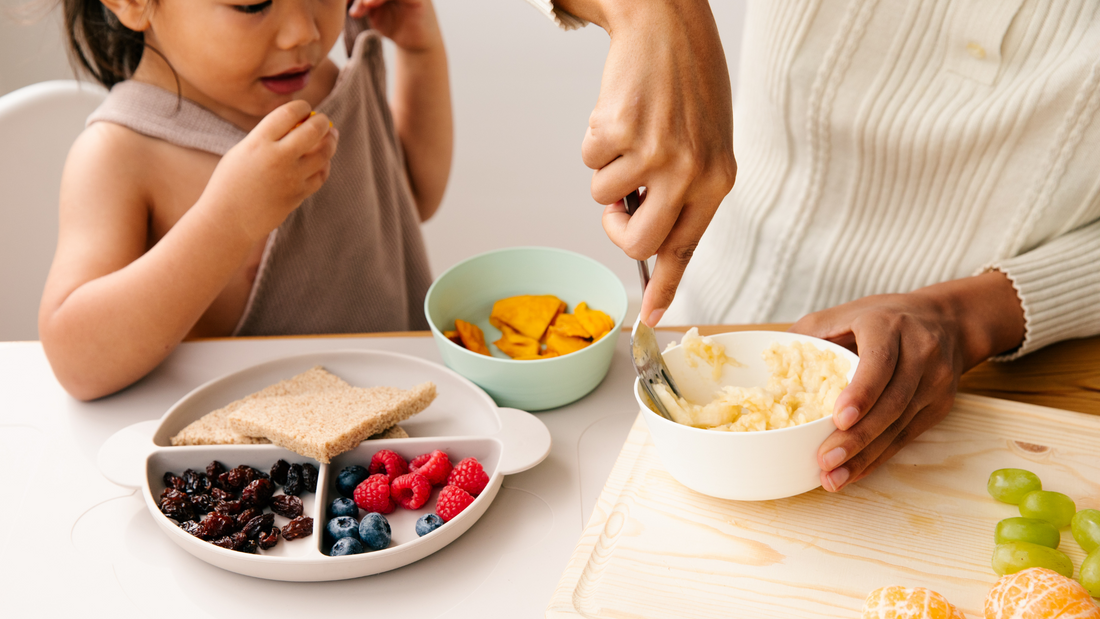
Why Homemade Baby Food is Better: Benefits of Going Natural
Share
Why Homemade Baby Food is Better: Benefits of Going Natural
As parents, feeding our babies healthy and nourishing meals is a top priority. With more families becoming conscious of what goes into their children’s food, homemade baby food has become a popular choice. For many, making baby food at home means greater control over ingredients and preparation methods, allowing a focus on fresh, nutrient-dense meals tailored to each baby’s unique needs. Let’s explore some key reasons why homemade baby food may be the better choice and the many benefits that come with going natural.
1. Control Over Ingredients
When preparing baby food at home, you have full control over what goes into each meal. You can select fresh, wholesome ingredients, avoid additives, and even choose organic options if you prefer. Unlike store-bought foods, which sometimes contain added sugars, salts, or preservatives, homemade baby food allows you to focus solely on essential nutrients without unwanted extras.
For example, a simple puree of sweet potato, carrot, or apple can be made without added sugar, offering pure flavors and nutrients. This level of control also allows you to respond to your baby’s preferences, introducing a variety of flavors and textures as they grow.
2. Freshness and Nutrient Retention
One significant advantage of homemade baby food is the freshness factor. Commercially prepared baby foods undergo processing and preservation to extend shelf life, which can lead to some nutrient loss. While many store-bought options are still nutritious, freshly prepared homemade food retains more vitamins, minerals, and enzymes—elements that play a vital role in early development.
Preparing baby food at home also allows you to manage cooking times and methods, which impacts nutrient retention. Steaming, for instance, preserves more nutrients in vegetables than boiling. By cooking and serving food immediately or freezing it for later, you can ensure your baby’s food is packed with the original nutrients.
3. Customisation to Meet Your Baby’s Nutritional Needs
Every baby is different, and their nutritional needs can vary based on factors like age, activity level, and specific health considerations. Homemade baby food offers the flexibility to tailor meals to meet those needs. As your baby grows, you can adjust the consistency, ingredients, and portion sizes to match their developmental stage and readiness for new textures.
If your baby needs extra iron, for example, you can include iron-rich ingredients such as spinach, sweet potatoes, or lentils. If they’re ready for more complex textures, you can introduce chunkier purees or soft-cooked finger foods. This flexibility is not always possible with pre-packaged foods, which tend to come in standard textures and flavors.
4. Reduced Risk of Allergies and Sensitivities
Homemade baby food gives you the opportunity to introduce new foods slowly and monitor any potential reactions. When you make food at home, you know precisely which ingredients are being used and can avoid any known allergens or ingredients that may cause sensitivities. This gradual introduction of single-ingredient purees can help you identify any issues early on, allowing for a safe and controlled way to expand your baby’s diet.
For instance, when starting with a vegetable puree, you could begin with a single ingredient like butternut squash and observe for a few days. If there’s no reaction, you can then introduce another food. This approach is an effective way to gradually build up your baby’s tolerance to a wider variety of foods.
5. Cost-Effective and Budget-Friendly
Making baby food at home can be surprisingly budget-friendly. Buying fresh produce in bulk or taking advantage of seasonal items often costs less than purchasing pre-packaged baby food. This approach also allows you to use up any extra fruits and vegetables you already have on hand, minimizing food waste and keeping your grocery bill manageable.
While the upfront time investment might be more than grabbing a jar off the shelf, batch-preparing baby food can help save time. Cooking in bulk and storing portions in the freezer ensures that you always have convenient, nutritious meals available, reducing the need to rely on pricier packaged options.
6. Environmentally Friendly Choice
Choosing homemade baby food is also a more sustainable option. Baby food jars, pouches, and other packaging contribute to waste, and not all packaging is easily recyclable. By making food at home and using reusable containers, you can reduce your family’s environmental impact and embrace a more sustainable lifestyle.
If sustainability is important to you, using fresh produce from local markets or even growing some ingredients at home can further reduce the carbon footprint associated with your baby’s food.
7. Familiarizing Your Baby with Family Meals
When you make baby food at home, you can gradually introduce your child to the same flavours, ingredients, and cooking styles your family enjoys. Over time, this approach helps familiarise them with the taste of family meals, making the transition to table foods smoother as they get older. Babies who are exposed to a wide range of flavors from the start are often more open to trying new foods as toddlers, which can support healthier eating habits long term.
For example, if your family enjoys flavors like mild herbs or certain spices, you can begin introducing these in small, baby-friendly portions. This can be as simple as adding a hint of basil to a vegetable puree, providing a hint of flavor without overwhelming their palate.
Tips for Preparing Homemade Baby Food
If you're new to making baby food at home, here are a few simple tips to get started:
- Start with Single Ingredients: Begin with one fruit or vegetable at a time to identify any allergies or sensitivities.
- Use Safe Cooking Methods: Steaming and baking are excellent methods to retain nutrients.
- Batch-Prepare and Freeze: Make a week’s worth of meals at once and freeze them in small, baby-sized portions.
- Use Reusable Storage Containers: Silicone trays or BPA-free containers can help reduce waste and keep your baby’s food safe and fresh.
Incorporating SG Homemade Seasonings for Convenience
For busy parents who still want to make homemade baby food, products like SG Homemade’s natural seasonings can be a time-saving addition. These seasonings add a depth of flavour and nutrition to homemade meals without added salt, sugar, or preservatives, which can simplify the cooking process for those who need a little convenience while still prioritising natural ingredients.
For instance, when preparing a vegetable puree, a small sprinkle of a seasoning like ikan bilis or scallop powder can boost flavour and nutrition, giving your baby’s food extra taste without relying on artificial flavours or additives.
Conclusion
Homemade baby food is a powerful way to nourish your child with wholesome, fresh ingredients, tailored to meet their unique needs. From nutritional benefits to environmental impact, going natural can be rewarding for both you and your baby. With a bit of planning and a few versatile ingredients, homemade baby food allows you to provide the healthiest possible start - one meal at a time.
For those times when you need a little extra help, options like natural seasonings can be an ideal way to add flavour and nutrients, bridging the gap between homemade convenience and natural goodness.

